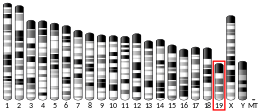BLOC1S2
Appearance
(Redirected from BLOS2)
Biogenesis of lysosome-related organelles complex 1 subunit 2 is a protein that in humans is encoded by the BLOC1S2 gene.[5][6][7]
Interactions
[edit]BLOC1S2 has been shown to interact with BLOC1S1,[6] SNAPAP,[6] MUTED,[6] CNO[6] and PLDN.[6]
References
[edit]- ^ a b c GRCh38: Ensembl release 89: ENSG00000196072 – Ensembl, May 2017
- ^ a b c GRCm38: Ensembl release 89: ENSMUSG00000057506 – Ensembl, May 2017
- ^ "Human PubMed Reference:". National Center for Biotechnology Information, U.S. National Library of Medicine.
- ^ "Mouse PubMed Reference:". National Center for Biotechnology Information, U.S. National Library of Medicine.
- ^ Yu Y, Zhang C, Zhou G, Wu S, Qu X, Wei H, Xing G, Dong C, Zhai Y, Wan J, Ouyang S, Li L, Zhang S, Zhou K, Zhang Y, Wu C, He F (Aug 2001). "Gene expression profiling in human fetal liver and identification of tissue- and developmental-stage-specific genes through compiled expression profiles and efficient cloning of full-length cDNAs". Genome Res. 11 (8): 1392–403. doi:10.1101/gr.175501. PMC 311073. PMID 11483580.
- ^ a b c d e f Starcevic M, Dell'Angelica EC (Jun 2004). "Identification of snapin and three novel proteins (BLOS1, BLOS2, and BLOS3/reduced pigmentation) as subunits of biogenesis of lysosome-related organelles complex-1 (BLOC-1)". J Biol Chem. 279 (27): 28393–401. doi:10.1074/jbc.M402513200. PMID 15102850.
- ^ "Entrez Gene: BLOC1S2 biogenesis of lysosome-related organelles complex-1, subunit 2".
External links
[edit]- Human BLOC1S2 genome location and BLOC1S2 gene details page in the UCSC Genome Browser.
Further reading
[edit]- Moriyama K, Bonifacino JS (2003). "Pallidin is a component of a multi-protein complex involved in the biogenesis of lysosome-related organelles". Traffic. 3 (9): 666–77. doi:10.1034/j.1600-0854.2002.30908.x. PMID 12191018. S2CID 29888859.
- Strausberg RL, Feingold EA, Grouse LH, et al. (2003). "Generation and initial analysis of more than 15,000 full-length human and mouse cDNA sequences". Proc. Natl. Acad. Sci. U.S.A. 99 (26): 16899–903. Bibcode:2002PNAS...9916899M. doi:10.1073/pnas.242603899. PMC 139241. PMID 12477932.
- Ciciotte SL, Gwynn B, Moriyama K, et al. (2003). "Cappuccino, a mouse model of Hermansky-Pudlak syndrome, encodes a novel protein that is part of the pallidin-muted complex (BLOC-1)". Blood. 101 (11): 4402–7. doi:10.1182/blood-2003-01-0020. PMID 12576321.
- Li W, Zhang Q, Oiso N, et al. (2003). "Hermansky-Pudlak syndrome type 7 (HPS-7) results from mutant dysbindin, a member of the biogenesis of lysosome-related organelles complex 1 (BLOC-1)". Nat. Genet. 35 (1): 84–9. doi:10.1038/ng1229. PMC 2860733. PMID 12923531.
- Ota T, Suzuki Y, Nishikawa T, et al. (2004). "Complete sequencing and characterization of 21,243 full-length human cDNAs". Nat. Genet. 36 (1): 40–5. doi:10.1038/ng1285. PMID 14702039.
- Deloukas P, Earthrowl ME, Grafham DV, et al. (2004). "The DNA sequence and comparative analysis of human chromosome 10". Nature. 429 (6990): 375–81. Bibcode:2004Natur.429..375D. doi:10.1038/nature02462. PMID 15164054.
- Wang Z, Wei H, Yu Y, et al. (2004). "Characterization of Ceap-11 and Ceap-16, two novel splicing-variant-proteins, associated with centrosome, microtubule aggregation and cell proliferation". J. Mol. Biol. 343 (1): 71–82. doi:10.1016/j.jmb.2004.08.034. PMID 15381421.
- Gerhard DS, Wagner L, Feingold EA, et al. (2004). "The status, quality, and expansion of the NIH full-length cDNA project: the Mammalian Gene Collection (MGC)". Genome Res. 14 (10B): 2121–7. doi:10.1101/gr.2596504. PMC 528928. PMID 15489334.




